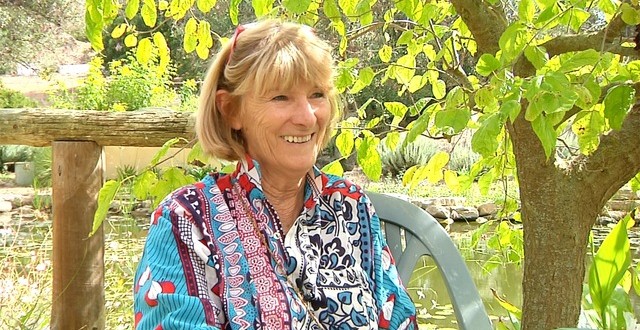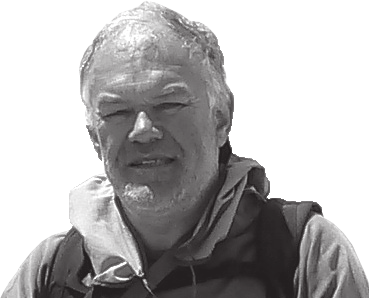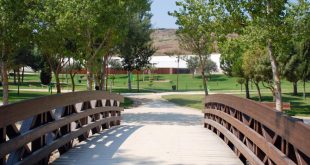There are several years’ work in this film. She seems to be exhausted. And so we have to wait for a few weeks for the interview. Our very personal interview is preceded by several lively exchanges of ideas by mobile phone. Why do you want to film me, BJ Boulter asks in one of her messages? She is not persuaded by the answer, that certain witnesses of contemporary history have earned their place in our ancestral gallery, but she agrees nonetheless. Finally, we meet La Grande Dame do Filme at her Quinta de Ochalá in Estombar near Lagoa. A table and three chairs are standing next to the miniature edition of her beloved Lake Victoria. She is sitting comfortably in one of them, the other two have been kept free for us. The scene takes place in the shadow of a mulberry tree. Then it starts raining.
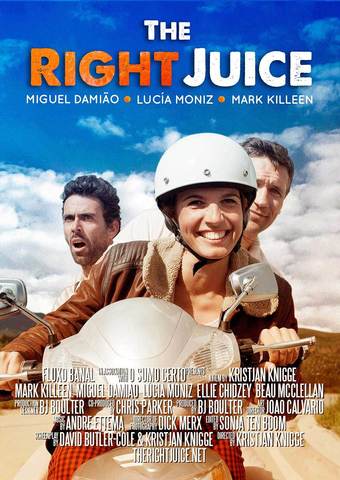
At exactly this moment, as the true professional, BJ opens a huge umbrella and pushes it between the table and the camera. This keeps our little set more or less dry. We do a sound test and start by chatting a bit about the first feature film produced by her and her son, which was filmed in the Algarve and was released this year. A few days earlier, BJ and the film’s team had invited people to the première at the Teatro das Figuras in Faro. There were standing ovations in the theatre where all 800 seats were sold, followed by a long party into the small hours
We are particularly interested in the background behind the glamour business with the red carpet: in the economics of the film. Because film is both a medium and a young art form, the technical interplay of image and sound; but above all, the synthesis of all the ancient art forms from novels and stories, to music and dance, from painting, photography and sculpture to architecture and design. Because once the script begins to take shape, the commercial aspect of cinema does so too, in parallel. The director and producer have to start thinking about the production and the budget for turning the script into a film: about camera equipment and filming days, fees for actors, costs for studio work. The list of costs is long and gets longer every day.
The question arises as to whether the art, imagination and patience of drumming up funding for a film project are not undervalued much too often. ECO123 asked the producer BJ Boulter whether her many years’ experience of filming in Africa had been an advantage:
ECO123: First, We’d like to talk about Africa: the origins of your soul.
BJ Boulter: Africa. Indeed.
BJ stands for Barbara Jane?
Yes, that is correct.
So, Barbara Jane, where were you born.
Oh, I was born in England.
What took you to Africa then?
My mother. My mother got on a ship with me when I was still a baby. She took me to meet up with my father who was then in Tanzania.
When did you come to the Algarve?
1962 – to join my parents here.
What has changed then?
In the Algarve, I would say attitude. The attitude has changed.
From what to what?
I think it’s less happy than it was.
That takes us to the point. Money. What does it mean to you?
Money. That’s a means to an end. If you want a car, you need money to buy one. If you want to travel somewhere, you need money to buy the ticket.
And a film?
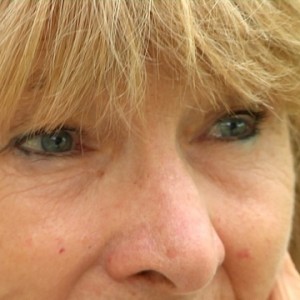
Yes, if you want to make a film, you need money to do so. In this case, we wanted to make a film, so we did a budget. And then we worked out how many parts of that budget would be available to us through people offering us those goods and services or financing it through money or crew members offering us their services for free or very cheaply or whatever. And we decided to have a go, especially as I’d never heard of crowdfunding at that time. I soon looked it up.
We have a short break in the interview. The frogs croak. The sun has returned. BJ Boulter talks about the way in which she started in the film business in the mid-1980s. She started by looking for locations for advertising films in East Africa, working on film sets too, and doing stage and costume design. She worked in Hong Kong and Australia. Scenes that she drew in her notebook at that time and then faxed to London for approval. It was still a time when telephone calls were quite expensive and satellite phone didn’t exist. And it was the unique light that fascinated her about Africa, and inspired her to paint there. Light is this unique characteristic that also makes the Algarve one of the most attractive film locations in Europe. BJ Boulter has been living here for more than half a century.
Several times, BJ Boulter seems not to hear our question about how much the 93-minute, bilingual film The Right Juice (Portuguese title “A Alma Certa”) had cost. She claimed not to have all the figures in her head. But those who know her, also know that that’s not right. And she is full of praise for all those who collaborated on the film for free. But finally, she reveals that 75,000 euros were raised for the film in active funding, and the same amount again in payments in kind: a low budget film, distributed to cinemas this year by Lusomundo and now on sale as a DVD.
One day you decided to make your first film.
(Laughs) Yes, but I’d been in the film business all my life. I started out as a designer, first costumes and then sets. And I designed sets in studios and on locations around the world for many years. I gradually became a line producer. Line producers, in a given place on the other side of the world, arrange everything necessary for the production that’s going to be done.
One day, I have a son, who at that time was not yet forty, and he had always wanted to make a movie. And we talked about movies, especially movies in Africa where it costs a fortune to make one. Scripts and different ideas. He by this time had done every job in the book. Starting out as a runner probably, but he’d done camera work, special effects. He’d done editing, he’d done everything; first assisting, all of the different jobs. About a decade ago, he decided he wanted to be a director and he was then directing, commercials, short films and documentaries. And that’s why he dreamed about making a movie. One October, we were actually having lunch in Silves, with my brother-in-law, my sister, and Christjan said “do you know what? This is the best place to make a movie. We know it. We love it. It has the light, it has the people, it has the stories. It has everything we need to be able to make a movie. And we don’t have any money and so we’re going to have to ask people to help us.”
Would you describe this film-making experience as thrilling?
Thrilling. That’s a good word because it was. The biggest thrill came from the people who wanted to help. That was amazing.
After this experience, what will you do differently in the future?
Different in terms of making films?
Yes.
I wouldn’t try to do it without money again. You entangle yourself too much. You wear too many different hats. You can’t do your own job to your own satisfaction and still get enough rest. You have so many jobs on your plate. In this film, many of us shared the different jobs. And we worked extremely hard to be able to do that. And that was due to a lack of money.
P.S.: A considerable part of the €75,000 film budget of “The Right Juice” came from Crowdfunding and 30 local sponsors.
 Eco123 Revista da Economia e Ecologia
Eco123 Revista da Economia e Ecologia

